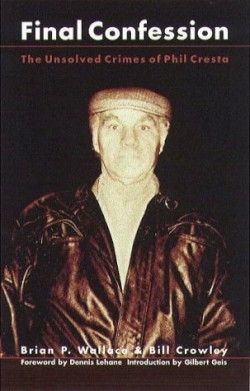
Final Confessions
The Unsolved Crimes of Phil Cresta
Although Boston resident Phil Cresta stole millions of dollars and was placed on the F.B.I.’s most wanted list, his name has failed to go down in the annals of crime history. Cresta, along with the aid of two accomplices, committed numerous crimes that have remained officially unsolved. Final Confessions reveals these crimes while also painting a social portrait of the Boston crime scene during the 1960s.
It would be easy for the reader to feel incredulous upon starting this book; Crowley obtained a great deal of the information about these crimes from conversations with Cresta before he died. Newspaper writer Wallace has researched the background of each crime, from police reports to F.B.I. files, and put together a convincing story.
Cresta was born on the north end of Boston, and grew up under the shadow of an abusive father. He went to prison for the first time when he was sixteen, but prison only increased his knowledge of how to commit crimes. Cresta became an expert at picking locks and forging keys, and learned to plan his crimes carefully.
Other criminals didn’t always know what Cresta was doing. Once, he entered a bar with the tops of three parking meters that he had removed while everyone else was watching the Kennedy inauguration. Everyone laughed. Cresta took the three meters—one for each type that the city used—and had keys made for them. With the keys and several official looking uniforms, he and his partners garnered some $250 dollars a day from the city of Boston, eventually stealing $100,000 dollars.
Other crimes proved more risky but no less ingenious. Cresta used inside information to learn about a jewel convention coming to Boston. The jewels of the attendees were stored in the Parker House safe at night with a timed combination. Cresta designed a large suitcase, like the cases used to store the merchandise of the other jewelers, which actually carried his partner and a small oxygen tank. Inside the safe, his accomplice stole jewels from two other cases, and then returned to his case to be carried to safety by Cresta in the morning.
It is easy to become engrossed in Final Confessions and forget that Cresta, ingenious and likable, was a criminal who didn’t mind hurting people to get what he wanted. The book’s authors seem to unabashedly turn him into a hero and downplay his more unsavory elements. The book still succeeds as both a sociological portrait of the Boston crime scene during the 1960s and as a psychological one of a clever criminal.
Reviewed by
Ronald D. Lankford, Jr.
Disclosure: This article is not an endorsement, but a review. The publisher of this book provided free copies of the book to have their book reviewed by a professional reviewer. No fee was paid by the publisher for this review. Foreword Reviews only recommends books that we love. Foreword Magazine, Inc. is disclosing this in accordance with the Federal Trade Commission’s 16 CFR, Part 255.
